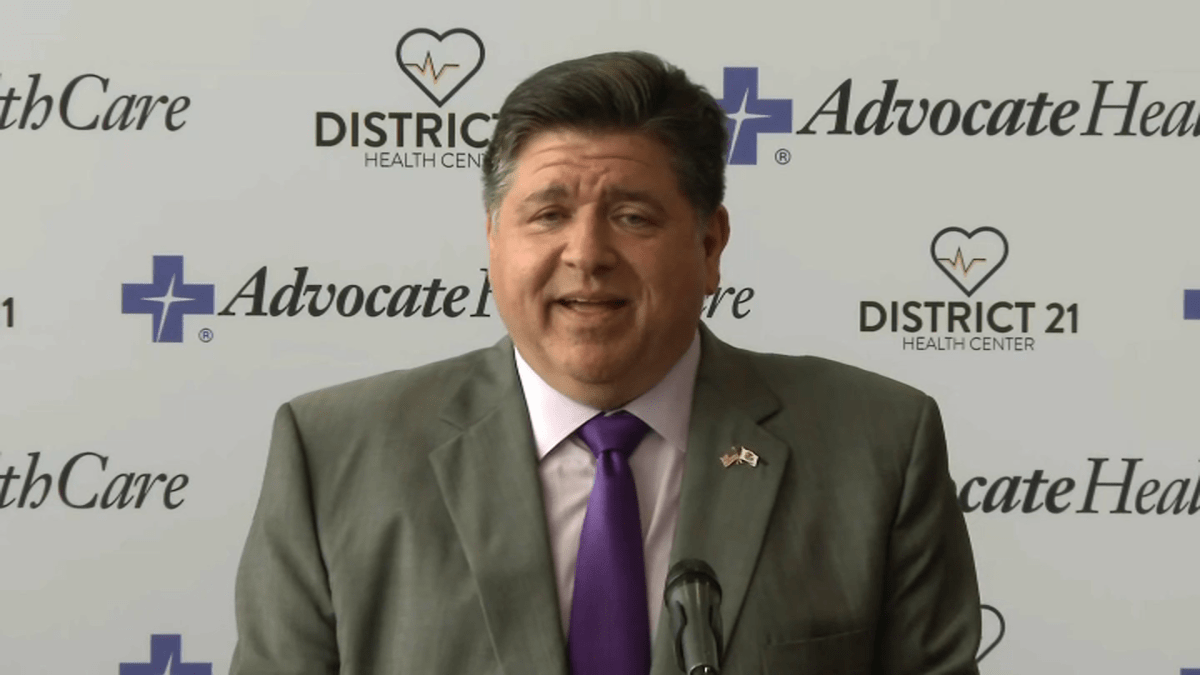Illinois Gov. J.B. Pritzker responded Monday after President Donald Trump called him “incompetent” and referred to the governor’s weight when discussing his potential run for president in 2028.
The two-time Democratic governor, a vocal critic of Trump, questioned the president’s authority to make good on some of his threats and rejected “everything else that he had to say this morning.”
Speaking to reporters following Trump’s Monday morning remarks, Pritzker said, “I reject criticism, and don’t really want to respond to criticism from Donald Trump, who inherited his money and then went bankrupt six times and then defrauded his business partners.
“And by the way, he cheats at golf too,” Pritzker said.
Trump earlier took aim at Illinois’ “no cash bail” policy while decrying Chicago crime, vowing to end the controversial law he called a “disaster.”
The comments came as Trump announced he was placing the DC Metropolitan Police Department under direct federal control and deploying the National Guard in an attempt to “rescue our nation’s capital from crime, bloodshed, bedlam and squalor.”
That wasn’t the only time Trump mentioned Chicago in his remarks Monday.
Trump also threatened a wider crackdown on crime that could spread to other American cities outside of D.C.
He said he hopes other cities, including Los Angeles, New York and Chicago, are watching the steps he’s announced in D.C. and would take steps to “self-clean up.”
He said that if needed, the administration would take similar steps in other cities.
“He has absolutely no right and no legal ability to send troops in to the city of Chicago,” Pritzker said.
But in addition to his comments on crime and policy, Trump also took aim at both Pritzker and Chicago Mayor Brandon Johnson, personally.
He called Chicago “a disaster” while describing Johnson and Pritzker as “incompetent.”
Trump also touched on speculation that Pritzker, a vocal critic of Trump’s, could run for president in 2028, saying, “I notice he lost a little weight, so maybe he has a chance, you know?”
“Donald, thanks for the compliment! Let’s not lie to the public, you and I both know you have no authority to take over Chicago. By the way, where are the Epstein files?” Pritzker wrote on X shortly after the remarks.
Johnson, meanwhile, touted what he said has been “historic progress” in Chicago’s crime. He said the city has seen a 30% decrease in homicides and a 40% reduction in shootings last year alone.
“Last week, we learned that President Trump cut another $158 million in funding for violence prevention programs in cities like Chicago. These cuts are on top of the Trump administration dismantling the Office of Gun Violence Prevention and terminating more than $800 million in grants for anti-violence programs across the country,” Johnson said in a statement. “If President Trump wants to help make Chicago safer, he can start by releasing the funds for anti-violence programs that have been critical to our work to drive down crime and violence. Sending in the national guard would only serve to destabilize our city and undermine our public safety efforts.”
Sen. Dick Durbin said Trump was “rewriting laws in every state.”
“He should focus on the laws he’s responsible for. The big beautiful budget, so to speak, is a bill that’s devastating for the American economy and the American people. He ought to address that,” Durbin said.
Can Trump send the National Guard to Chicago?
It wouldn’t be the first time Trump has deployed National Guard troops to a U.S. city
President Donald Trump’s administration federalized California National Guard members and sent them to Los Angeles over the objections of Democratic Gov. Gavin Newsom and city leaders, after protests erupted June 7 when Immigration and Customs Enforcement officers arrested people at multiple locations.
On Monday, Trump said he was deploying the National Guard across Washington, D.C., and taking over the city’s police department in the hopes of reducing crime, even as the mayor has noted that crime is falling in the nation’s capital.
But the move is also at the center of a legal battle.
California asked a judge in San Francisco to order the Trump administration to return control of the remaining troops to the state and to stop the federal government from using military troops in California “to execute or assist in the execution of federal law or any civilian law enforcement functions by any federal agent or officer.” They allege the president’s move violated federal law.
The 1878 Posse Comitatus Act prevents the president from using the military as a domestic police force.
The Trump administration argued the troops were needed to protect federal buildings and personnel in Los Angeles, which has been a key location in the federal government’s aggressive immigration strategy.
Trump federalized members of the California National Guard under Section 12406 of Title 10, which allows the president to call the National Guard into federal service when the country “is invaded,” when “there is a rebellion or danger of a rebellion against the authority of the Government,” or when the president is otherwise unable “to execute the laws of the United States.”
The case could set precedent for how Trump can deploy the guard in the future in California or other states.
“It’s clear to me, and to most legal experts, that he just does not have the right or ability to do it,” Pritzker said.







